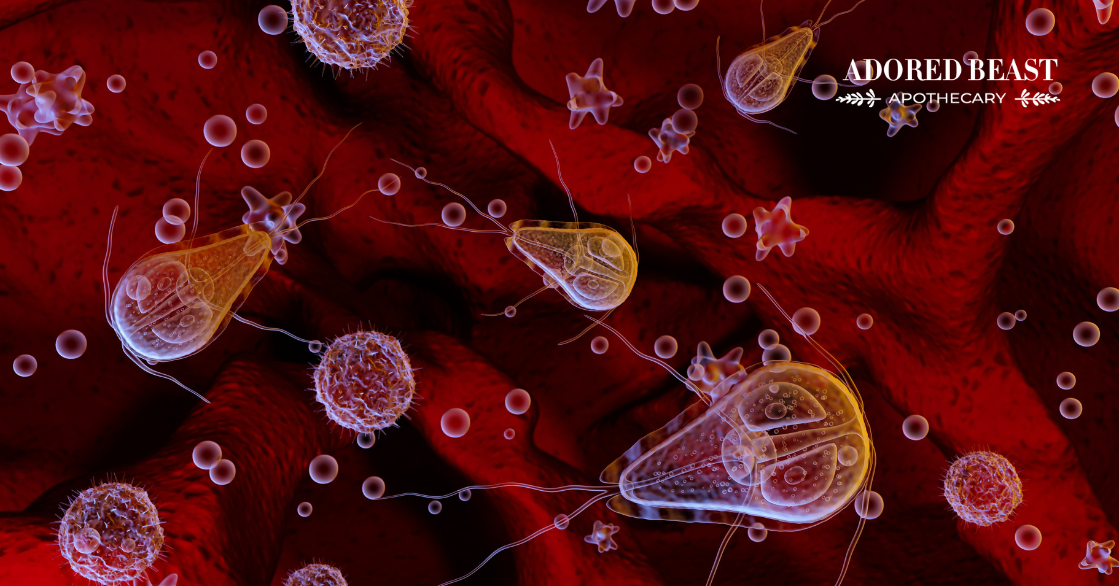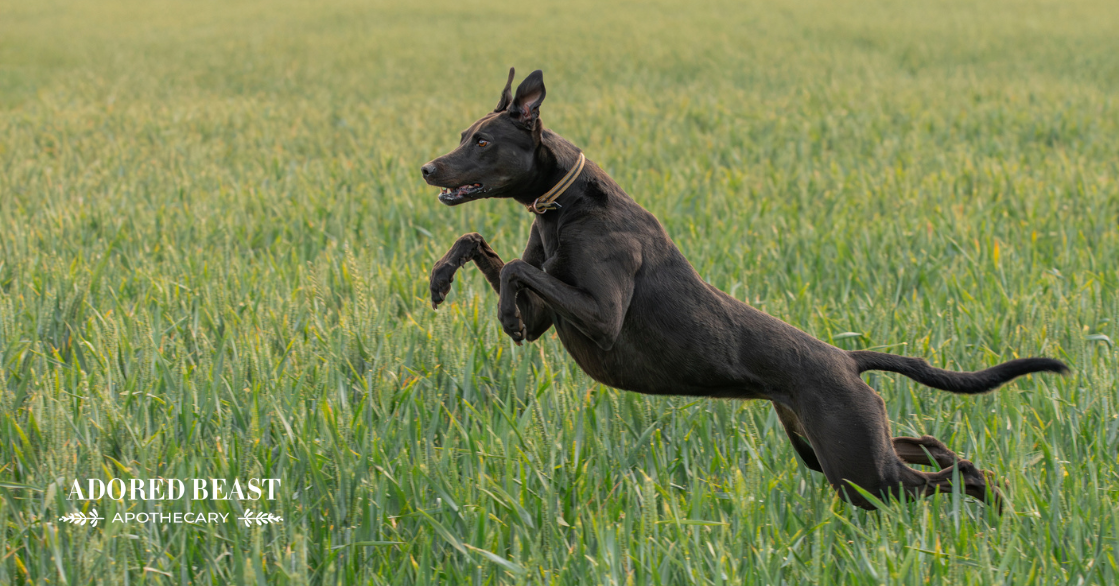Have you noticed something strange with your dog’s digestive system? Is their poop runnier than normal, mucousy, or really smelly? Do they seem to have trouble maintaining their weight? There are lots of things that can get things off track, and one potential culprit is giardia.
Giardia in dogs is a common but often misunderstood parasite that can affect dogs of all ages. While it can be alarming to discover your dog has giardia, understanding what it is, recognizing the symptoms, and knowing how to treat it can help you manage this condition effectively. Let’s break down everything you need to know about giardia, including conventional treatments and natural approaches.
What is Giardia in Dogs?
Giardia is a microscopic parasite that lives in the intestines of infected animals. It’s not a worm, but rather a protozoan organism that can cause gastrointestinal distress. To survive, it feeds off other living organisms (like your dog) to survive. Once inside your dog, giardia calls your pet’s intestines home and creates a giardia infection.Giardia comes in two forms: a motile form (trophozoite) that lives and multiplies in the intestines and a cyst form that is excreted in feces. The cysts are highly resistant to environmental conditions and can survive for weeks or even months in water, soil, or on surfaces.
Dogs get giardia by ingesting the parasite in its cyst form. Common sources include:
- Contaminated Water: Drinking from puddles, ponds, or other stagnant water sources.
- Fecal-Oral Transmission: Contact with infected feces or contaminated surfaces.
- Grooming: Licking or cleaning contaminated fur or paws.
Puppies, senior dogs, and dogs with weakened immune systems are more susceptible to giardia infections.
Many dogs with giardia may not show any symptoms, but when they do, it’s usually related to digestive upset. Watch for the following signs:
- Diarrhea: Often soft, greasy, or with a foul odor. You may also notice blood in their poop.
- Vomiting: In some cases, dogs may vomit intermittently.
- Weight Loss: Chronic giardia can interfere with nutrient absorption.
- Lethargy: A dog may seem less active or tired.
- Dehydration: Resulting from prolonged diarrhea.
If you notice these symptoms, especially the persistent diarrhea, it’s important to consult your veterinarian for a proper diagnosis. That will usually mean bringing in a stool sample to be tested.
Treating Giardia
Giardia won’t go away on its own, so if your dog is diagnosed, you need to treat it. But that can be done conventionally or holistically.
The standard conventional treatment for giardia typically involves medications like metronidazole or fenbendazole prescribed by a veterinarian. The thing is, these can be harsh on a healthy system, not to mention an already compromised one. And since you’re trying to stop vomiting and diarrhea, it isn’t super helpful that their side effects usually include vomiting and diarrhea! And since giardia can sometimes take a while to get rid of, the long-term use of these drugs make them even riskier.
Instead, we turn to Mother Nature first! Thankfully, there are lots of things to take from your toolkit to address giardia in dogs naturally.
- Dietary Support: Any time a dog has digestive upset we like to suggest going with a bland diet during the acute phase to reduce digestive stress and give it time to relax. This includes boiled chicken, bone broth, and foods rich in fibre, such as pumpkin, to help firm up stools.
- Probiotics: High-quality probiotics can help restore gut flora and strengthen the digestive system, making it harder for parasites to thrive. They can also protect the immune system!
- Herbal Remedies: Several herbal remedies can be effective to manage the giardia:
- Oregon Grape Root: Known for its antimicrobial properties, this herb can attack parasites and help combat infections. Use a tincture and give 12 drops per 20 pounds of body weight. One important note: we don’t recommend it for dogs with liver issues or pregnant or lactating dogs.
- Goldenseal: Contains berberine, which may have anti-parasitic effects. Use a dried powder or tincture. For powder, mix 1 teaspoon per 20 pounds of body weight into food. For a tincture, give 5 to 10 drops per 20 pounds of body weight, 2 to 3 times a day.
- Ginger: (dry or fresh). Research shows that ginger helps reduce the number of Giardia trophozoites.* Pair it with cinnamon, and give 1/8 tsp for small dogs, 1/4 tsp for medium dogs and 1/2 tsp for large dogs.
- Cinnamon: (only Ceylon, please; ground fresh is possible). Research shows that cinnamon reduces the number of Giardia cysts, especially when paired with ginger. Give 150 mg/kg daily.
- Garlic: Fresh, crushed garlic can act as a natural anti-parasitic because of the allicin. Let it sit for 15 minutes after chopping and peeling to release the allicin. Give twice a day: for small dogs, up to ¼ clove, medium dogs, ½ clove, large dogs, up to ¾ clove, and giant dogs, up to 1 clove.
- Immune System Support: Include immune-boosting supplements like medicinal mushrooms or immunoglobulins to enhance your dog’s natural defenses.
- Environmental Management: Regularly sanitize your dog’s living spaces, food bowls, and toys. Use a pet-safe disinfectant to clean surfaces. Bathe your dog on a regular basis to remove any lingering cysts from their coat.
Can You Prevent Giardia?
Giardia in dogs is actually fairly common – as many as 1 in 3 have it. Thankfully, many don’t show any symptoms, which means the body is on top of it and handling it. In these cases, you don’t need to do anything except continue supporting the gut and immune system. That’s a good preventative as well – giardia is an opportunist and will overload a compromised gut.
For prevention, you also want to keep their environment clean. This includes food bowls, bedding, and toys. Pick up poop in the yard and get rid of standing water.
Also, if you can (we know it’s sometimes easier said than done), try to avoid letting your dog drink from questionable sources. Contaminated water is one of the most common sources of giardia in dogs, so try to keep your pet from seeking out water in puddles, slow-moving creeks, etc.
While giardia can be an unpleasant experience for both dogs and their owners, it’s a manageable condition with the right approach. It does take time, but by understanding what causes giardia, recognizing the symptoms, and taking proactive steps to treat and prevent it, you can ensure your dog stays healthy and happy.












